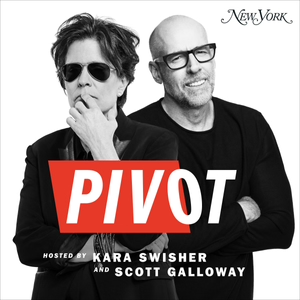
The Caixin-Sinica Business Brief, episode 64
09/24/18 • 12 min
Previous Episode

The Caixin-Sinica Business Brief, episode 63
Welcome to the 63rd installment of the Caixin-Sinica Business Brief, a weekly podcast that brings you the most important business stories of the week from China’s top source for business and financial news. Produced by Kaiser Kuo of our Sinica Podcast, it features a business news roundup, plus conversations with Caixin reporters and editors. This week: We note that China’s largest ride-hailing platform Didi Chuxing said it will resume late-night ride-hailing service after upgrading its safety measures. We explore the effects of the disappearance of Fan Bingbing, China’s biggest female film star, and how the Communist Party of China weighs in on everything from the appropriateness of costumes to the salaries of movie stars. We hear about how the revised tax code has made it easier to levy taxes on foreign employees’ offshore income, and what that may mean for China attracting foreign talent. We discuss risk aversion in mainland stocks, as Hong Kong stocks follow their mainland counterparts’ fall into bear market territory amid some of the weakest turnover in years. We find out that the operator of Alipay, one of China’s two dominant mobile-payment apps, has announced it will spend $150 million over the next three years to speed up the development of “mini apps.” We analyze how China has scrapped several family planning departments, fueling speculation that the country may be on the verge of ending its decades-old restrictions on family size. We dive into a new report from the American Chamber of Commerce in China that says two-thirds of American businesses in the country are feeling a pinch from tit-for-tat protective tariffs in the U.S.-China trade war. We learn that China is investigating a former top lottery official on allegations of corruption — the third misconduct case involving a lottery chief in just over a year. In addition, we talk with Caixin Global reporter David Kirton about petrochemical plants in China. We also chat with Doug Young, managing editor of Caixin Global, about the IPOs of electric car maker Nio in New York, and superapp Meituan-Dianping in Hong Kong. We’d love to hear your feedback on this product. Please send any comments and suggestions to [email protected]. See Privacy Policy at https://art19.com/privacy and California Privacy Notice at https://art19.com/privacy#do-not-sell-my-info.
Next Episode

The Caixin-Sinica Business Brief, episode 65
Welcome to the 65th installment of the Caixin-Sinica Business Brief, a weekly podcast that brings you the most important business stories of the week from China’s top source for business and financial news. Produced by Kaiser Kuo of our Sinica Podcast, it features a business news roundup, plus conversations with Caixin reporters and editors. This week: We find out that Chinese stocks fell to four-year lows last week, following a sharp decline in the U.S. We hear that two years after becoming one of the world’s 10 most valuable public companies, social networking giant Tencent has passed a less flattering milestone by crashing out of the same elite club. We learn that Alibaba founder Jack Ma 马云, who plans to become a teacher after retiring next year, has reclaimed the title of richest man in China, with a fortune of $39 billion, according to the latest Hurun Rich List. We discuss a new report that finds out that the value of Chinese outbound mergers and acquisitions slumped in the first half of the year, as countries that included the U.S., Germany, and Australia imposed restrictions on deals, and China tightened controls on overseas spending. We note that the U.S. Treasury Department has found that China isn’t manipulating the yuan, as the Trump administration prepares to issue a closely watched report on foreign currencies, sources told Bloomberg. We dive into an outlook report published by the OECD and the UN, which predicts that China’s dinner tables will be getting meatier over the next decade, which will have a significant impact on the international agriculture trade. We report that Hong Kong is planning a total ban on electronic cigarettes. If passed, the ban would place the city alongside over a dozen countries that have outlawed e-cigarettes, which typically allow users to inhale nicotine and flavorings heated by battery-powered elements without the burning that traditional cigarettes require. We analyze the news that veteran regulator Yao Gang 姚刚, a former vice chairman of the China Securities Regulatory Commission, has been sentenced to 18 years in prison for taking bribes and insider trading. In addition, we talk with Fran Wang, economics reporter for Caixin Global, about an interview with Yi Gang 易纲, the head of People’s Bank of China, China’s central bank. We also chat with Doug Young, managing editor at Caixin Global, about a company called Brilliance Auto and its partnership with BMW. We’d love to hear your feedback on this product. Please send any comments and suggestions to [email protected]. See Privacy Policy at https://art19.com/privacy and California Privacy Notice at https://art19.com/privacy#do-not-sell-my-info.
If you like this episode you’ll love
Episode Comments
Generate a badge
Get a badge for your website that links back to this episode
<a href="https://goodpods.com/podcasts/the-caixin-sinica-business-brief-50379/the-caixin-sinica-business-brief-episode-64-12456183"> <img src="https://storage.googleapis.com/goodpods-images-bucket/badges/generic-badge-1.svg" alt="listen to the caixin-sinica business brief, episode 64 on goodpods" style="width: 225px" /> </a>
Copy




